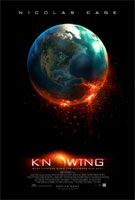Nicolas Cage has brought us plenty of crazy movies in the past few years, but Knowing is a doozy of an entirely different level. Dark City and I, Robot director Alex Proyas peppers his take on the disaster movie with a whole host of other genre elements, including ghost stories, conspiracy thrillers and a dash of whacked-out sci-fi. The five credited writers, Proyas included, may deserve the blame for this mishmash, but Proyas clearly thinks he's presenting us with some kind of directorial vision. Maybe you'll have better luck than I did with figuring out what that vision is.
The movie that's been advertised in the trailers, in which cynical astrophysicist John Koestler (Nicolas Cage) discovers a mysterious set of numbers that may predict the end of the world, is really only the half of it. Maybe only a quarter of it. The movie opens in the 1950s, with a The Omen type prologue about a troubled little girl named Lucinda (Lara Robinson) who scrawls down the numbers and puts them in her elementary school's time capsule. 50 years later John's son Caleb (Chandler Canterbury) is a student at the same school when they open the capsule, and he's already hearing some of the same voices that plagued Lucinda when he receives her message.
Caleb is convinced it might mean something, and soon John is too, staying up all night circling the numbers and detecting a telltale pattern-- they reveal the exact location, date and death toll of every major disaster of the last 50 years. In psychology this typically a symptom of schizophrenia, but in Knowing, John is soon proved right when he witnesses a plane crash, and realizes there are two disasters left on the list-- one of them possibly the big one. He eventually tracks down Lucinda's daughter Diana (Rose Byrne) and granddaughter Abby, and has them running around the Boston area trying to avoid the apocalypse while also trying to stop it.
The movie's two action set pieces, heavily promoted in the trailers, are about as different in skill as it gets. The plane crash is filmed in a single tracking shot that follows John as he walks through the wreckage, both harrowing and thrilling in its realism. On the other hand, a subway derailment in a poorly recreated Manhattan subway station is filmed so frenetically and without any sense of rhythm that it feels more like a visual assault than an experience. Both sequences, incidentally, suck every ounce of fun out witnessing the destruction, completely removing that visceral thrill in disaster movies of seeing a familiar part of the world destroyed.
Because, it seems, Knowing isn't really a disaster movie, or at least wants to pretend it isn't. The numbers conspiracy theory gives way to end-of-days prophecies and some creepy blonds that Caleb dubs "the Whisper People," and if I told you what ending that all led to, you wouldn't believe me anyway. As Knowing gets increasingly preposterous, and Cage's stony deadpan acting seems even sillier in context, a kind of slack-jawed joy may overtake you. How on earth did this movie get made? How did anyone involved think they had a story worth telling? And, as always, what is Nicolas Cage thinking?
Staff Writer at CinemaBlend
Most Popular





